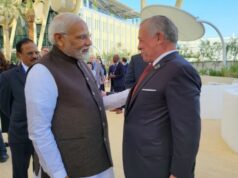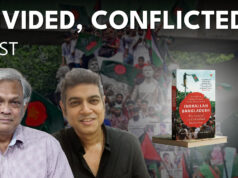Prominent political scientist and author Ahmet T. Kuru emphasized the importance of democracy, intellectual freedom, and economic independence in Muslim societies during the launch of the Hindi edition of his bestselling book, Islam, Authoritarianism, and Underdevelopment.
The event, organized by the Khusro Foundation at the International Book Fair in New Delhi, had National Security Adviser Ajit Doval as the Chief Guest and veteran journalist and author MJ Akbar as the Guest of honour.
In his address, Kuru said that while his book has been translated into 15 languages, the Hindi edition holds particular significance due to India’s diverse religious landscape, including its 200 million-strong Muslim population. “India is a crucial space for discussions on Islam, authoritarianism, and development,” he remarked.
Kuru, Professor of Political Science and Director of the Center for Islamic and Arabic Studies at San Diego State University, traced the historical trajectory of Islamic civilization, particularly the Golden Age from the 8th to 12th centuries, when Muslim societies were at the forefront of scientific and philosophical advancements.
“Muslims learnt from ancient civilizations—papermaking from China, mathematics from India, and philosophy from Greece—and later transmitted this knowledge to Europe,” he explained. During this period, religious, political, economic, and intellectual spheres remained largely independent, fostering dynamism and innovation.
However, he argued that the decline of Muslim societies began before colonialism, countering the notion that Western imperialism was the sole cause. Instead, he attributed the stagnation to the Ulema-State alliance, which saw religious scholars become deeply embedded in state structures, stifling intellectual freedom and economic entrepreneurship.
Contrasting the Islamic Golden Age with Europe’s period of stagnation from the 5th to 12th centuries when the Catholic Church and state were deeply intertwined, he noted that Europe began to advance only after the separation of religion and state, which allowed for economic and intellectual flourishing.
Drawing parallels with modern challenges, he warned against the fusion of state and corporate power, citing figures like U.S. President Donald Trump and tech billionaire Elon Musk. “When the state and corporations become too intertwined, it leads to corruption and a decline in democracy,” he cautioned.
Kuru also criticized the rise of political Islam, citing examples from the Taliban, Saudi Arabia, and Iran, where religion and politics remain deeply enmeshed, often leading to social and economic crises. He proposed that the solution for Muslim societies lies in democracy and equal citizenship, not as a Western import, but as a return to their own historical tradition of pluralism and intellectual openness.
“The democratization of Muslim societies is not an American or European agenda. It is rooted in Muslim history,” he stated. He called for Muslim-majority nations to embrace equal rights for all citizens, regardless of religion, and urged Muslim minorities worldwide to engage positively within their respective societies.
To illustrate the importance of intellectual independence, Kuru referenced Abu Hanifa, the 8th-century Islamic scholar and merchant who refused state patronage, valuing scholarly and economic autonomy over political control. He encouraged young Muslims to look to figures like Abu Hanifa as models for fostering a progressive future.
Ajit Doval on Conflict Resolution and Societal Progress
In his address, National Security Adviser Ajit Doval offered a broader historical and philosophical perspective on state-religion relations. He emphasized that the relationship between religion and state is not unique to Islam, and has evolved across civilizations.
Doval highlighted how Indian traditions historically resolved ideological and theological conflicts through dialogue and debate, contrasting this with societies that resorted to coercion. He cited ancient Indian debates, such as the legendary discourse between Mandana Mishra and Adi Shankaracharya, as examples of intellectual engagement without repression.
He pointed out that when religion and state power become too intertwined, the ability to generate new ideas and progress stagnates. He specifically noted that some Islamic societies resisted advancements, such as the adoption of the printing press, which delayed their intellectual and democratic development.
Doval also critiqued the tendency to blame colonialism for all of the challenges faced by Muslim societies. “While colonial exploitation played a role, there were also internal factors that contributed to stagnation,” he said. He stressed the need for introspection, encouraging societies to critically examine their own shortcomings rather than attributing all failures to external forces.
“The world does not remain static. We have to evolve our thoughts, our governance, and our societies. Societies that delay in adapting to democracy and intellectual progress will always lag behind,” he warned.
MJ Akbar, who spoke before Doval, lauded Kuru’s scholarship, praising the academic rigour and objectivity with which he tackled complex historical and political questions. He described the book as a compelling study of the rise, decline, and potential renewal of Muslim societies, highlighting the central role of ‘asabiyyah’ or social cohesion in historical transformations.
Discussing the historical ascent of Islamic civilizations, Akbar referenced the 7th-century transformation of Arabian society, arguing that the driving force behind the rapid expansion of Islam was not merely military power but a newfound collective spirit. However, he observed that while asabiyyah initially facilitated unity and progress, its later association with royalty hindered the transition to the modern nation-state.
Turning to the topic of Sufism, Akbar argued that its success lay in its practical, rather than purely spiritual, applications. “Sufism works because it teaches us how to share, how to create relationships based on mutual benefit rather than hostility,” he stated.
He also reflected on the historical relationship between feudalism and religion, suggesting that ruling elites across various faiths used religious legitimacy to secure their authority. “Even today, the British monarch remains the head of the Church of England,” he pointed out, highlighting the enduring link between governance and religion.
Underlining how Indian Muslims and Indonesians enjoy democratic freedoms while others remain under authoritarian rule, he noted: “Half a billion Muslims live in free and unfettered democracies,” and contrasted this with China’s historical lack of democracy.
He stressed that beyond democracy itself, the real challenge for Muslim societies is the revival of a knowledge-driven culture. Citing the historical example of Islamic scholars amassing vast libraries and centres of learning, he lamented the decline that followed when ruling elites restricted access to knowledge. He pointed out how the delay in adopting the printing press by Muslim societies led to stagnation, arguing that the unwillingness to democratize knowledge has had long-term consequences.
The Case of Pakistan and the Modern Nation-State
Akbar provided a critical perspective on Pakistan’s founding ideology, asserting that it was created not for Muslims, but for Islam as a political project. However, political slogans like “Islam is in danger” mislead people, as faith itself cannot be endangered, he said, asserting. “Islam was never in danger—not when there was only one Muslim in the world, and certainly not today.”
He concluded by stating that Muslim societies must come to terms with modernity and embrace political structures that align with contemporary realities. “Feudalism is not the answer. The nation-state is a modern necessity, and understanding its demands is crucial for future progress,” he remarked.
The event, moderated by Khusro Foundation Convenor Dr Hafeezur Rahman, had several senior bureaucrats and other officials as well as a large number of visitors to the book fair in attendance.
In a career spanning three decades and counting, Ramananda (Ram to his friends) has been the foreign editor of The Telegraph, Outlook Magazine and the New Indian Express. He helped set up rediff.com’s editorial operations in San Jose and New York, helmed sify.com, and was the founder editor of India.com.
His work has featured in national and international publications like the Al Jazeera Centre for Studies, Global Times and Ashahi Shimbun. But his one constant over all these years, he says, has been the attempt to understand rising India’s place in the world.
He can rustle up a mean salad, his oil-less pepper chicken is to die for, and all it takes is some beer and rhythm and blues to rock his soul.
Talk to him about foreign and strategic affairs, media, South Asia, China, and of course India.




